How Service Dogs Benefit and Impact Veterans’ Well-Being
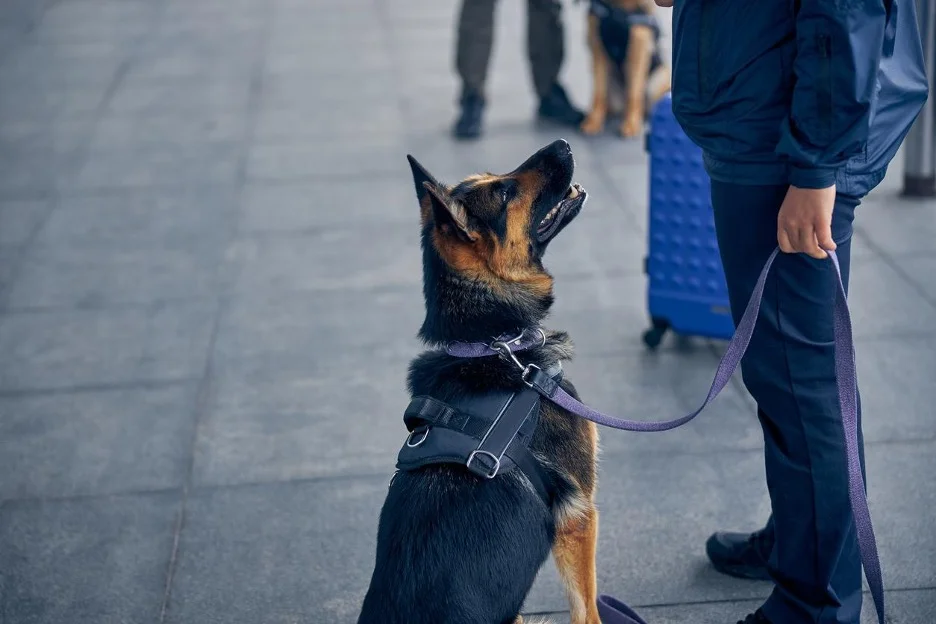
Service animals can play a pivotal role in aiding veterans who face physical and mental challenges due to their military service. These animals, often dogs, are extensively trained to provide tailored support. Around 27% of veterans reported having a service-connected disability as of August 2022, and at least 7% of veterans will experience post-traumatic stress (PTS) at some point in their lives.
For veterans with physical disabilities, service animals can assist with tasks such as retrieving items, opening doors, and maintaining balance — restoring a sense of autonomy. They can also play an important role in supporting veterans’ mental health. For those dealing with conditions like PTS, anxiety, and depression, these animals can detect signs of distress and intervene appropriately. Although the Americans with Disabilities Act (ADA) provides that dogs and miniature horses can become service animals, this article will focus on service dogs and answer common questions, such as:
- What are service animals?
- How do service animals help veterans?
- Does the VA provide service animals to veterans with PTS?
- What is the Service Dog Assisting Veterans (SAVES) Act meant to do?
- How can we support veterans in need of service animals?
What are service animals?
If a veteran is experiencing significant physical, mental, or mobile limitations in their day-to-day life, they may qualify for a service dog. The U.S. Bureau of Labor Statistics reported that about 27% of veterans have a service-connected disability as of August 2022 — with rates particularly high among post-9/11 veterans. Moreover, according to the Department of Veterans Affairs (VA), at least 7% of veterans overall will experience post-traumatic stress (PTS) at some point in their lives compared to 6% of non-veterans. For post-9/11 veterans, the rate is 29%, and 15% have reported symptoms in the last 12 months.
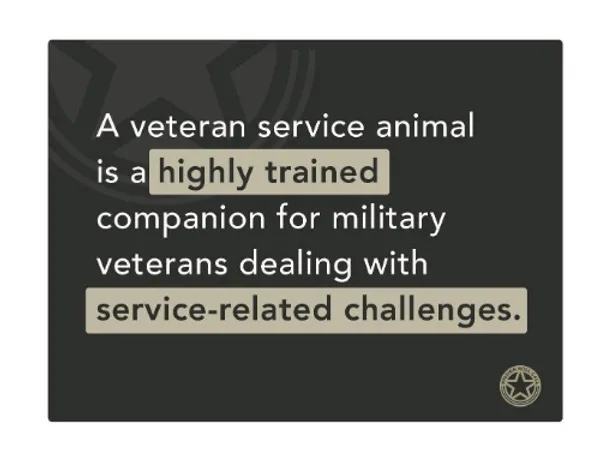
A veteran service animal is a highly trained companion for military veterans dealing with service-related challenges. Typically dogs, these animals learn tasks like retrieving objects, opening doors, and providing balance support to enhance the veteran’s independence. Beyond physical assistance, they can recognize signs of distress, waking a veteran up from nightmares, calming panic attacks, and helping reduce feelings of isolation and depression.
There are different categories of service dogs, with some capable of fulfilling multiple roles. In contrast to emotional support dogs, service dogs undergo intensive training programs to equip them for aiding the veterans they are matched with. Some types of service dogs include:
- Psychiatric service dogs trained to assist those with PTS, severe anxiety, and major depression;
- mobility assistance dogs for those with physical limitations;
- guide dogs for the visually impaired;
- hearing dogs for the hearing impaired; and
- diabetes assistance dogs that are scent-trained to detect blood sugar levels.
Veterans enrolled in VA healthcare who meet certain requirements can be pointed to organizations that match them to the right animal based on their needs, medical history, and lifestyle. These animals are not mere pets; they serve as a crucial link to normalcy, independence, and psychiatric healing for those who served their country.
The deep bond between a veteran and their service animal can even be therapeutic, providing a sense of purpose and responsibility that traditional treatments do not. For example, for a veteran experiencing panic attacks, a service dog can be a grounding presence and companion, helping to alleviate anxiety. Moreover, they can help combat isolation and encourage veterans to be more engaged and active in their daily lives. Through their training and companionship, veteran service animals offer a path to an improved quality of life for veterans who have made significant sacrifices.
How Service Animals Help Veterans
The bond formed with a service animal can often transcend companionship and become a source of healing and emotional support. Research has shown connections between the presence of a service dog, specifically one for PTS, and better regulation of the stress hormones associated with anxiety and PTS. Therapy is usually the “first-line approach” for veterans with PTS, and the success largely depends on the severity of symptoms. For long-term conditions, treatment often also includes medication and other lifestyle changes. To this end, service dogs can be a great complementary — or replacement — treatment, potentially keeping the veteran from having to increase medication doses, and reducing suicidal ideation.
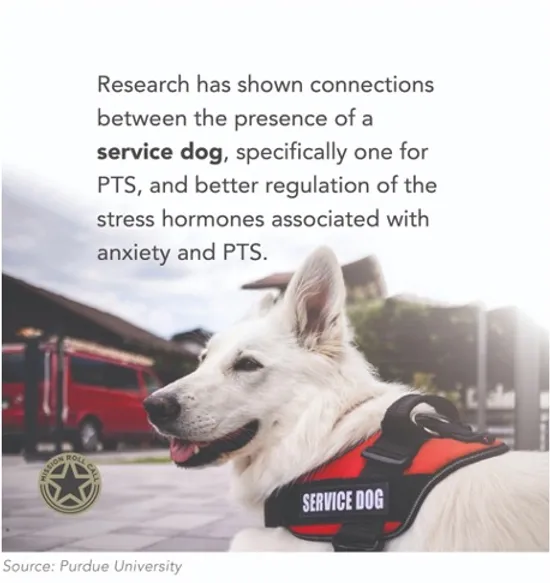
Only about 50% of veterans — around 9 million — are enrolled in VA healthcare or affiliated with a veteran service organization. Of the 6 million veterans served by the VA healthcare system in fiscal year 2021, about 10% of men and 19% of women were diagnosed with PTS. Data from the RAND Center for Military Health Policy Research shows that less than half of veterans in need of mental health services receive treatment. Of those who do receive treatment – for PTS and major depression specifically — less than one-third are getting evidence-based care.
Moreover, the veteran community consistently deals with a concerning rate of suicide. America’s Warrior Partnerships interim report suggests at least 40-44 former service members die by suicide or self-harm every day. And while suicide should not only be looked at through the lens of mental health issues, as there are a range of contributing factors, PTS and other mental health conditions do play a role. But even if those issues are not a determining factor in a veteran’s dark spiral with suicidal ideation, when someone gets to that point they usually feel alone and unloved. A service dog can provide a powerful backstop to those thoughts.
When it comes to conditions like depression, anxiety, and PTS, there’s a need for effective holistic, alternative treatments. Ongoing research on the human-animal bond shows service animals can help ease PTS symptoms, reduce anxiety, and even improve sleep for veterans who have experienced trauma. By helping to foster healthy routines, a sense of independence, and emotional connection, service animals can also contribute to veterans with service-connected disabilities’ reintegration into society. These animals serve as steadfast allies, facilitating veterans’ journeys toward improved well-being and an enhanced quality of life.
Does the VA provide service animals to veterans with PTS?
For service animal-related benefits, a veteran must first be enrolled in VA healthcare. In certain cases, VA benefits will cover care and equipment for service dogs. Veterans must first meet with their healthcare provider to discuss their physical or mental health limitations to determine if a service dog will be an appropriate treatment approach. Each case is individually reviewed by a clinician to assess the goals to be accomplished by getting a service dog and the ability and means of the veteran to care for the dog.
Upon approval for a service dog, veterans are referred to Assistance Dogs International accredited agencies or International Guide Dog Federation accredited agencies to be paired with the right type of service dog. From there, they can also have their service dog enrolled in Veterinary Health Benefits now, thanks to recent expansions in the VA benefits. This includes comprehensive treatment and wellness checks, emergency care, immunizations, and illness treatment for the dog that will be serving the veteran.
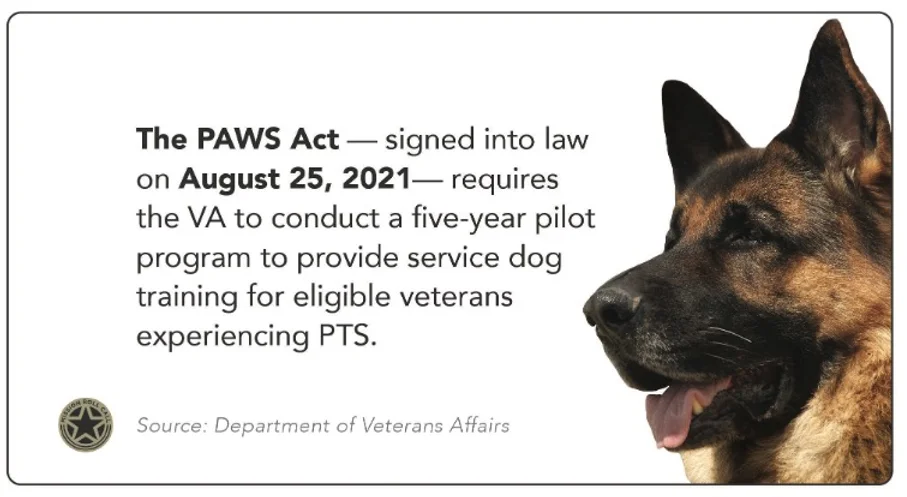
They are also provided with the proper equipment, such as a harness or vest, with the hope of ensuring that the service dogs remain in good health to best serve veterans.
VA healthcare currently does not cover training, medications, food, grooming, or other ongoing expenses. Promisingly, the Puppies Assisting Wounded Servicemembers for Veterans Therapy (PAWS) Act — signed into law on August 25, 2021— requires the VA to conduct a five-year pilot program to provide service dog training for eligible veterans experiencing PTS as part of a “complementary and integrative health program.” The program is meant to explore the benefits of service dog training, and based on the data, the training could potentially be included in comprehensive healthcare benefits for service animals in the near future.
The Importance of the SAVES Act
The Service Dogs Assisting Veterans (SAVES) Act is legislation meant to help match veterans with a service dog in an effort to better support the mental health of former service members.
Introduced in June 2021 and led by Senators Thom Tillis (R-N.C.) and Richard Blumenthal (D-Conn), the bill would establish a program to “award grants to nonprofit organizations that provide and place service animals with veterans while also building on the PAWS Act, which could open the door for the VA to assist in the training of service animals.
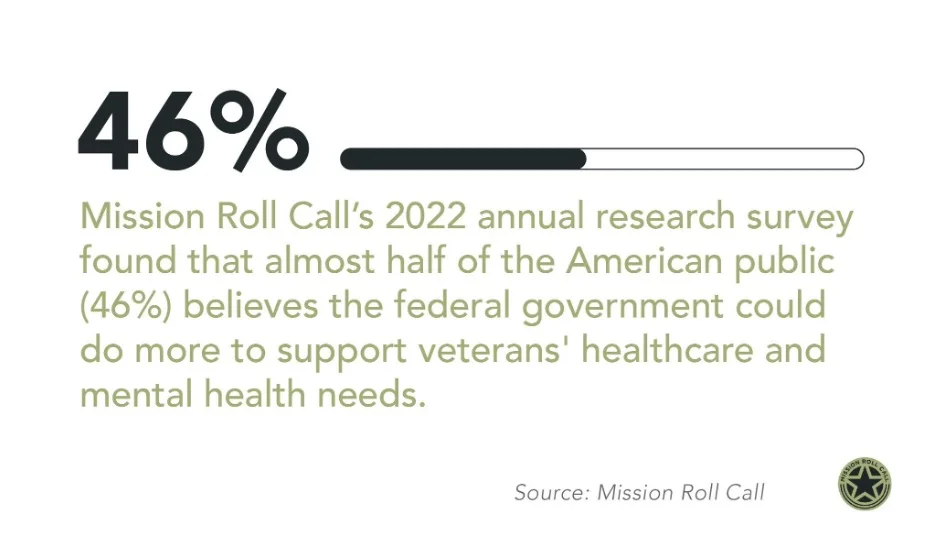
An estimated 20% of Iraq and Afghanistan war veterans in particular are experiencing PTS, and more than 450,000 service members have been diagnosed with a traumatic brain injury over the last 20 years— underscoring the need for a proactive approach to ensuring the health and well-being of our country’s former service members. In fact, Mission Roll Call’s 2022 annual research survey found that almost half of the American public (46% ) believes the federal government could do more to support veterans’ healthcare and mental health needs. Initiatives like the SAVES Act are a step in the right direction.
How can we support veterans in need of service animals?
As individuals, we can play a role in encouraging the well-being, mobility, and overall quality of life for veterans experiencing mental health challenges or physical service-related disabilities. Not only does checking in as a supportive loved one help, but informing and connecting veterans in your life to options for service animals could make a huge difference as well.
There are several organizations that train and provide service animals for veterans, such as K9s for Warriors, the nation’s largest provider of trained service dogs for veterans with PTS, traumatic brain injury, or military sexual trauma. Additional organizations include SemperK9, America’s Vet Dogs, Patriot Service Dogs, and Canine Companions.
Mission Roll Call continues to partner with veteran service organizations to raise awareness and meet the needs of our nation’s former service members. Specifically, we advocate for proactive initiatives and policies that can help prevent suicide among veterans; ensure veteran access to quality healthcare, and address the inequities underserved veteran communities are experiencing.
Learn more about our mission and get involved by signing up for our newsletter, participating in our member polls, or making a donation. You can also contact your congressional representative and urge them to support and prioritize legislation such as the SAVES Act and other policies that can make a positive impact on the lives of our nation’s veterans.